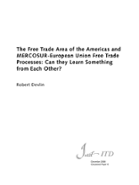The Free Trade Area of the Americas and MERCOSUR-European Union Free Trade Processes: Can They Learn Something from Each Other?
Date
Dec 2000
EDITOR
INTAL
The FTAA process itself has already generated important positive externalities for the hemisphere and the multilateral system. It has provided a regular forum in which 34 countries'; trade delegations have gotten to personally know each other better on a first name basis. This increasing personal espirit des corps not only has enhanced the FTAA process, but has also provided a new stage for resolving bilateral trade issues and undertaking new initiatives. Since the baseline for the FTAA is the WTO disciplines, FTAA meetings have been a learning laboratory for many delegations regarding the complex Uruguay Round obligations and other areas not yet contained therein (e.g., Competition Policy and mechanisms for communication with Civil Society). The Preparatory Stage also generated many comparative databases and inventories on trade-related issues among the 34, increasing intergovernmental transparency in trade relations. Moreover, thanks to the release of most of this information to the public, this transparency has been transmitted to private markets as well. Independently of whether an FTAA is actually realized in 2005, it has steady marched forward to date. The success raises the question about whether there are lessons for other ambitious transcontinental, or interregional, trade initiatives. More specifically, are there lessons for the just initiated MEU trade negotiations? Alternatively, are there possible lessons from the MEU approach for the FTAA process? The purpose of this paper is to preliminarily address these questions. There are serious limitations to doing so, however. First, the FTAA process is relatively advanced with more than 5 years of intense work behind it, yet it is still very incomplete and it remains to be seen whether the ultimate objective of a free trade area (FTA) is achieved. Meanwhile, the MEU negotiations have just begun in earnest. Hence, the evaluation of the former is based on an advanced process with incomplete outcomes, while the evaluation of the latter is based on only very initial steps of a process. The economic and political contexts of the two negotiation processes are quite different as well.



